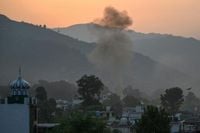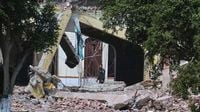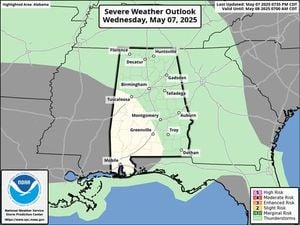On Wednesday, May 7, 2025, tensions between India and Pakistan escalated dramatically as both nations exchanged heavy artillery fire along their contested frontier. This surge in violence follows India's missile strikes aimed at Pakistan, marking the worst conflict between the two nuclear-armed neighbors in two decades. Reports indicate that at least 34 people have died as a result of the hostilities, with Pakistan claiming 26 civilian deaths due to Indian bombardments, while India reported eight fatalities from Pakistani shelling.
The recent military actions stem from a deadly attack on April 22, 2025, in Pahalgam, Indian-administered Kashmir, which left 26 people dead. India accused Pakistan of harboring militants from the group Lashkar-e-Taiba, a UN-designated terrorist organization, responsible for the assault. In response, the Indian government launched what it termed "Operation Sindoor," targeting nine sites in Pakistan that it claimed were linked to terrorist activities.
According to the Indian army, the strikes successfully destroyed nine "terrorist camps," with military officials asserting that their actions were "focused, measured, and non-escalatory in nature." However, Pakistan's Defense Minister Khawaja Muhammad Asif condemned the strikes, alleging that they were politically motivated actions by Indian Prime Minister Narendra Modi, aimed at boosting his domestic popularity.
In a press conference, Lieutenant General Ahmed Sharif Chaudhry of the Pakistani military declared that five Indian jets had been shot down in retaliation for the missile attacks. He stated, "The retaliation has already started. We won't take long to settle the score." An Indian senior security source, who requested anonymity, confirmed that three Indian fighter jets had crashed on home territory, with wreckage reported in Wuyan, Kashmir.
In Muzaffarabad, the main city of Pakistan-administered Kashmir, residents described the chaos following the strikes. Abdul Sammad, a local resident, recounted hearing multiple explosions, while Waqar Noor, the interior minister for Pakistan-administered Kashmir, confirmed that at least one child was killed in the attacks. The Pakistani government declared a state of emergency in hospitals across the region, and schools were closed in anticipation of further conflict.
The Indian army accused Pakistan of conducting "indiscriminate" firing across the Line of Control (LoC), which serves as the de facto border in Kashmir. Reports from the Indian town of Poonch indicated that at least eight Indians were killed, with 29 others wounded due to shelling.
International reactions have poured in, with US President Donald Trump expressing hope that the fighting "ends very quickly." The United Nations also urged both nations to exercise maximum restraint, with Secretary-General Antonio Guterres emphasizing that the world cannot afford a military confrontation between India and Pakistan.
As the situation continues to unfold, Iranian Foreign Minister Abbas Araghchi is expected to visit New Delhi, following discussions in Islamabad, as Tehran seeks to mediate the escalating conflict.
In light of the ongoing violence, the international community has ramped up calls for diplomacy between the two nations. The US State Department has urged both India and Pakistan to pursue a responsible resolution that maintains long-term peace and regional stability in South Asia.
The backdrop of this conflict is rooted in a long history of tensions between India and Pakistan, dating back to their partition in 1947. The two countries have fought multiple wars and engaged in numerous skirmishes over the disputed region of Kashmir, which both claim in its entirety but control only parts of.
As the fighting escalates, residents on both sides of the border are left to grapple with the consequences of this renewed aggression. Reports of civilian casualties and destruction of property highlight the severe human cost of the conflict. The situation remains fluid, with both governments maintaining a posture of readiness for further military engagements.
In conclusion, the current escalation between India and Pakistan represents a significant and dangerous turning point in their fraught relationship. As both nations prepare for potential further conflict, the international community watches closely, hoping for a de-escalation that could prevent a larger crisis.






